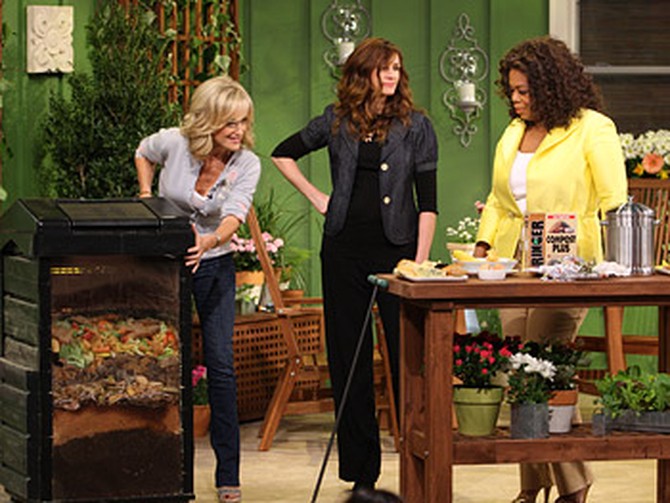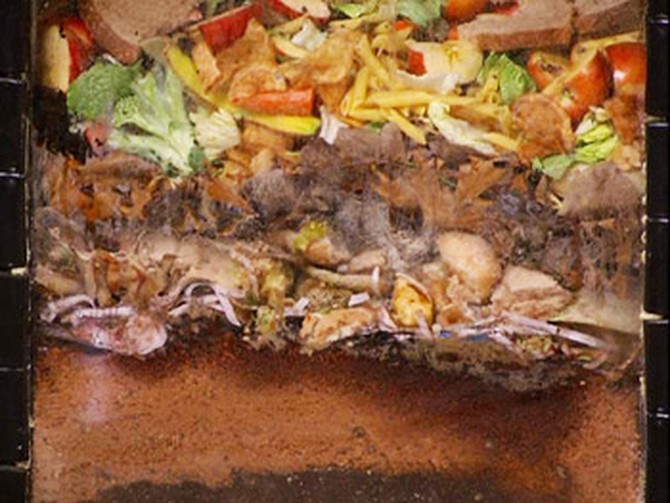Eliminate Food Waste

With three young children at home, Hollywood mom Julia Roberts says her family used to waste a lot of leftover food. "I [used to] just cry and scrape plates and think, 'How can I be doing this?'"
Thanks to her eco-conscious friend Sophie Uliano, author of Gorgeously Green, Julia says she discovered a way to put her waste to good use—composting. "I do love composting," she says. "This is one of the things that Sophie has really been on me about."
Sophie says it's easy to turn leftover fruits, veggies, grains and paper products into compost, a natural alternative to commercial fertilizer. "You can turn your waste into gold—literally brown gold," Sophie says. "It's the most nutritious thing that you can put in your garden."
Thanks to her eco-conscious friend Sophie Uliano, author of Gorgeously Green, Julia says she discovered a way to put her waste to good use—composting. "I do love composting," she says. "This is one of the things that Sophie has really been on me about."
Sophie says it's easy to turn leftover fruits, veggies, grains and paper products into compost, a natural alternative to commercial fertilizer. "You can turn your waste into gold—literally brown gold," Sophie says. "It's the most nutritious thing that you can put in your garden."

The first thing you need to start eliminating food waste is a composting bin. The next step, Sophie says, is to create a "garbage lasagna" inside the bin, which eventually decomposes and becomes vitamin-rich plant food.
The garbage lasagna's first layer is made up of brown matter like sawdust and leaves from your garden. The second layer is green matter, which consists of everything from apple peelings and coffee grounds to egg shells and shredded bills. Sophie says you should not put fish, meat, eggs and dairy products in your composter because they attract rats and flies.
Once your layers are in place, Sophie suggests adding a booster to the mix every week. This component helps stabilizes nutrients and reduce odors.
Every week, Sophie says you should also use a mixing tool to move the matter around in the bin.
"Give it a really good fluff up," she says. "You need to aerate it. You mix the lasagna up to get oxygen into the lasagna."
The garbage lasagna's first layer is made up of brown matter like sawdust and leaves from your garden. The second layer is green matter, which consists of everything from apple peelings and coffee grounds to egg shells and shredded bills. Sophie says you should not put fish, meat, eggs and dairy products in your composter because they attract rats and flies.
Once your layers are in place, Sophie suggests adding a booster to the mix every week. This component helps stabilizes nutrients and reduce odors.
Every week, Sophie says you should also use a mixing tool to move the matter around in the bin.
"Give it a really good fluff up," she says. "You need to aerate it. You mix the lasagna up to get oxygen into the lasagna."

Apartment-dwellers can also reduce waste with small, indoor composters.
"You can put everything in—meat, fish, eggs, the works," Sophie says. "You just throw it all in there. Put a few handfuls of sawdust pellets, a bit of baking soda. It grinds it up, and it heats it. With this, you get the compost very, very quickly."
If you don't have an outdoor space like Julia's, Sophie suggests taking your compost to a friend with a yard or scattering it on a roadside.
"You can put everything in—meat, fish, eggs, the works," Sophie says. "You just throw it all in there. Put a few handfuls of sawdust pellets, a bit of baking soda. It grinds it up, and it heats it. With this, you get the compost very, very quickly."
If you don't have an outdoor space like Julia's, Sophie suggests taking your compost to a friend with a yard or scattering it on a roadside.

Another way people can recycle their leftover food is through vermicomposting. This process uses earthworms to turn organic wastes into high-quality compost.
It may sound icky, but Sophie says the waste worms produce is the most nutritious thing you can put in your yard.
To start vermicomposting, you'll need a bin, bedding and a few thousand worms, which you can order on the Internet. "The waste goes in there, and the worms crawl up, devour the waste, and then they're really happy," Sophie says.
Find out more about composting from Sophie's book Gorgeously Green .
It may sound icky, but Sophie says the waste worms produce is the most nutritious thing you can put in your yard.
To start vermicomposting, you'll need a bin, bedding and a few thousand worms, which you can order on the Internet. "The waste goes in there, and the worms crawl up, devour the waste, and then they're really happy," Sophie says.
Find out more about composting from Sophie's book Gorgeously Green .
Published 01/01/2006

